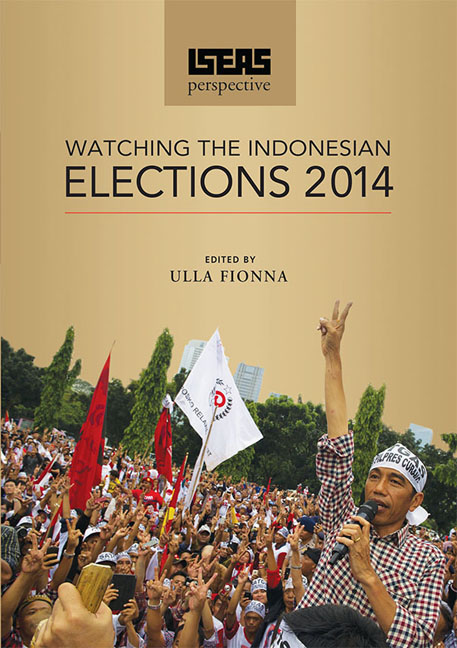Book contents
- Frontmatter
- Contents
- Foreword
- Introduction
- 1 The Gubernatorial Race in Jakarta: Background and Implications
- 2 Indonesian Parties Struggle for Electability
- 3 Who Will Be Indonesian President in 2014?
- 4 Indonesian Presidential Election Forcing Rejuvenation of Parties
- 5 Resisting Democracy: Front Pembela Islam and Indonesia's 2014 Elections
- 6 Getting to Know the Contestants of the 2014 Indonesian Parliamentary Elections
- 7 A Snapshot of the Campaigning in Indonesia's 2014 Legislative Elections
- 8 Unpacking the Results of the 2014 Indonesian Legislative Elections
- 9 Indonesia's 2014 Legislative Elections: The Dilemmas of “Elektabilitas” Politics
- 10 The Islamic Factor in the 2014 Indonesian Elections
- 11 Vote-buying in Indonesia's 2014 Elections: The Other Side of the Coin
- 12 Gap Narrows Between Candidates in Indonesian Presidential Elections
- 13 Analysing the Economic Platforms in the Indonesian Presidential Election
- 14 Indonesian Islamic Parties After the 2014 Elections: Divided and Self-Centred
- 15 Safeguarding Indonesia's Pluralism: An Essential Task for Joko Widodo
- 16 Jokowi's Key Economic Challenge: Improving Fiscal Policy for Equitable Growth
- 17 Crossing the River While Avoiding the Stones: Jokowi's Run-up to the Presidency
- 18 Post-elections Indonesia: Towards a Crisis of Government?
- Epilogue: Jokowi's First Months: Compromise Cabinet, Subsidy Cuts, and Corrupt Coalition
10 - The Islamic Factor in the 2014 Indonesian Elections
Published online by Cambridge University Press: 29 July 2017
- Frontmatter
- Contents
- Foreword
- Introduction
- 1 The Gubernatorial Race in Jakarta: Background and Implications
- 2 Indonesian Parties Struggle for Electability
- 3 Who Will Be Indonesian President in 2014?
- 4 Indonesian Presidential Election Forcing Rejuvenation of Parties
- 5 Resisting Democracy: Front Pembela Islam and Indonesia's 2014 Elections
- 6 Getting to Know the Contestants of the 2014 Indonesian Parliamentary Elections
- 7 A Snapshot of the Campaigning in Indonesia's 2014 Legislative Elections
- 8 Unpacking the Results of the 2014 Indonesian Legislative Elections
- 9 Indonesia's 2014 Legislative Elections: The Dilemmas of “Elektabilitas” Politics
- 10 The Islamic Factor in the 2014 Indonesian Elections
- 11 Vote-buying in Indonesia's 2014 Elections: The Other Side of the Coin
- 12 Gap Narrows Between Candidates in Indonesian Presidential Elections
- 13 Analysing the Economic Platforms in the Indonesian Presidential Election
- 14 Indonesian Islamic Parties After the 2014 Elections: Divided and Self-Centred
- 15 Safeguarding Indonesia's Pluralism: An Essential Task for Joko Widodo
- 16 Jokowi's Key Economic Challenge: Improving Fiscal Policy for Equitable Growth
- 17 Crossing the River While Avoiding the Stones: Jokowi's Run-up to the Presidency
- 18 Post-elections Indonesia: Towards a Crisis of Government?
- Epilogue: Jokowi's First Months: Compromise Cabinet, Subsidy Cuts, and Corrupt Coalition
Summary
INTRODUCTION
One of the main surprises from the recently held legislative elections in Indonesia (9 April 2014) was the better-than-expected performance of Islamic parties. Taken together, they managed to garner around 32 per cent of the vote share (as against close to 29 per cent in 2009). Multiple polling institutions had announced for some time that such parties were going to fare poorly. The Prosperous Justice Party (Partai Keadilan Sejahtera, PKS) had been embroiled in a beef graft import scandal in 2013, while the botched experiment of Islamism in the Middle East, following the 2011 Arab Spring uprisings, did not signal anything positive for the advancement of political Islam in Indonesia. However, PKS managed to limit the damage (winning around 6.9 per cent of the votes, down from 7.88 per cent in 2009) by interpreting the graft scandal as a conspiracy against the party and by relying on its long-term charity strategy on the local level, a common feature of Islamist movements. For sympathizers, whatever happened in Jakarta could not nullify the dedication of PKS cadres in helping communities in dire times, such as the 2013 Jakarta floods or the eruption of Sinabung volcano in 2014. The other important surprise was the National Awakening Party's (Partai Kebangkitan Bangsa, PKB) success in recovering its constituency within the traditionalist organization Nahdlatul Ulama (NU), garnering about 9 per cent of the vote. The United Development Party (Partai Persatuan Pembangunan, PPP — 6.7 per cent) and the National Mandate Party (Partai Amanat Nasional, PAN — 7.5 per cent) have similarly managed to establish themselves as mid-sized parties, whose support will be key to the “big three”: PDI-P, Golkar and Gerindra. The Crescent and Star Party (Partai Bulan Bintang, PBB — 1.6 per cent), the only true conservative Islamist party, did not manage to pass the electoral threshold of 3.5 per cent.
With July's presidential elections looming, have the results of the legislative elections shown that political Islam is still a force to be reckoned with? While the current volatility of political manoeuvring makes predictions on future coalitions rather risky, past events may give us hints of things to come.
AN ALLIANCE OF ISLAMIC PARTIES?
One could ask whether the 32 per cent vote share can translate into some form of unity for the coming presidential elections.
- Type
- Chapter
- Information
- ISEAS PerspectiveWatching the Indonesian Elections 2014, pp. 85 - 93Publisher: ISEAS–Yusof Ishak InstitutePrint publication year: 2015

